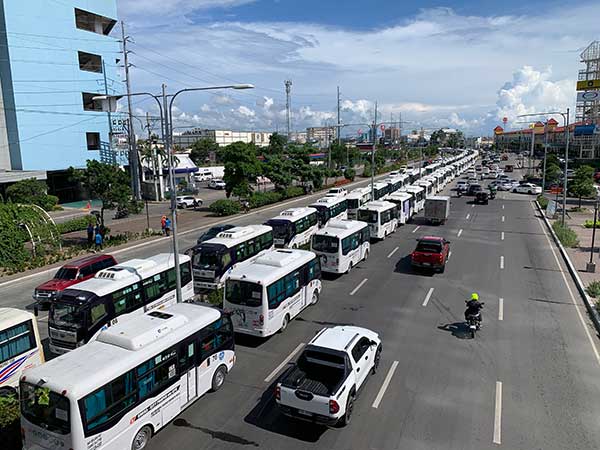
By Rjay Zuriaga Castor
President Ferdinand Marcos Jr.’s decision to continue implementing the Public Utility Vehicle Modernization Program (PUVMP) did not come as a surprise, transport cooperatives in Western Visayas said.
Two high-ranking officials of the Western Visayas Alliance of Transport Cooperatives and Corporations, Inc. (WVATCCI), told Daily Guardian that they had anticipated the outcome, highlighting that democratic decisions are often guided by majority rule.
“We already expected it. We are not surprised by the president’s decision. We have been anticipating it,” WVATCCI Chairman Rizal Alido said on Wednesday, August 7.
“Almost 80 percent have already been consolidated. This is a democratic government and the government should be based on the majority,” he added.
Alido also emphasized the significant P1.7 billion investment made by 14 transport cooperatives under WVATCCI to meet the modernization requirements.
Perfecto Yap, a Board of Trustees member of WVATCCI, said, “We expected that this would be the action taken by the president because we believe in the democratic process, where it is always the majority that rules.”
Yap disclosed that WVATCCI’s position paper had been personally submitted to the Office of the President. In their paper, the alliance appealed for “fair and just attention” and asked to exempt Iloilo City’s implementation of its enhanced Local Public Transport Route Plan from the potential suspension of PUVMP.
On Monday, over 500 modernized jeepneys and some consolidated traditional jeepneys of the WVATCCI held a 2-hour unity caravan along the Diversion Road in Mandurriao district to protest the proposal to suspend the PUVMP.
Meanwhile, traditional jeepneys opposing the PUVMP offered free rides to commuters.
The No to PUV Phaseout Coalition Panay (NTPPC) criticized Marcos’ decision, arguing that his stance prioritizes the interests of large suppliers, banks, and certain cooperative and corporate leaders over the broader public interest.
The NTPPC said the president’s decision was anti-poor and urged the public to unite in defense of their livelihoods and interests.
“The President’s decision has reinforced our resolve to unite and fight for our rights and interests. We call on everyone—drivers, operators, and the public—to come together now more than ever,” the coalition said in a statement.
In an ambush interview on Wednesday, Marcos refuted claims that the PUVMP was rushed, noting that the program had been postponed seven times.
He stressed that those objecting and asking for the program’s suspension are in the minority.
“Eighty percent have already consolidated, so how can it be that the 20 percent will decide the fate of the 100 percent? We should listen to the majority, and the majority says we should continue,” he said.
In Western Visayas, 77.2 percent, or 6,584, of public utility jeepneys have complied with the consolidation requirement.
The province of Iloilo leads with 99 percent consolidation, followed by Guimaras at 98 percent and Antique at 97 percent.
Negros Occidental and Aklan have achieved 91 and 89 percent, respectively, while Capiz and Iloilo City stand at 82 and 75 percent.
Bacolod City has the lowest rate, with only 50 percent of its 2,313 jeepney units consolidated.
In a statement, the Pagkakaisa ng mga Samahan ng Tsuper at Operator Nationwide (PISTON) condemned President Marcos Jr.’s decision to ignore the Senate’s call for the suspension of the Public Transport Modernization Program (PTMP), arguing that true modernization cannot occur without fundamental social reforms.
PISTON asserted that the modernization of the Philippine public transportation system must be rooted in national independence from foreign dominance, genuine agrarian reform, and national industrialization.
These elements, according to the group, are essential for creating a transportation system that prioritizes the needs of the people over foreign corporate interests.
“However, Marcos Jr.’s actions demonstrate a disregard for the plight of jeepney drivers, operators, and commuters,” PISTON said.
“Ignoring the Senate’s call for the suspension of the PTMP reveals a deliberate refusal to acknowledge the suffering caused by this program. Instead, it seems this regime’s priorities lie in benefiting businesses and bureaucrats, even if it means burdening hardworking citizens with excessive debts and fares.”
In light of increasing poverty, unemployment, and the soaring cost of living, PISTON emphasized that genuine modernization is unattainable as long as leaders prioritize foreign and corporate interests over the people’s well-being.
The group called for a fundamental shift away from an unjust social system that perpetuates inequality and sidelines the needs of ordinary Filipinos.





















